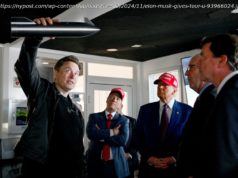With U. S. decertification looming, the other partners in the agreement lobby furiously to keep it.
Here’s what the signatories to the Iran deal agree on: On July 14,2015, China, France, Germany, Russia, the U. K., the U. S., and the EU reached an agreement with Iran to limit its nuclear program. Under the Joint Comprehensive Plan of Action, its official name, the Islamic Republic agreed, among other things, to freeze its nuclear program for 15 years in exchange for sanctions relief.
Now comes the difference of opinion between the U. S. and the other signatories to the agreement—and it is significant, because the future of the Iran deal is in question. On October 15, President Trump must decide whether to certify to Congress that Iran is complying with the agreement, as he is required by law to do every 90 days. He has signaled he will not. This does not mean the deal will evaporate immediately; rather, it will be up to Congress to decide within 60 days whether or not to reimpose sanctions on the Islamic Republic, which will put the United States in de facto violation of the deal. Many of Trump’s foreign-policy advisers, and all of his European partners, have urged him to stay in because, in their view, the deal is working and walking away from it would send a bad signal to North Korea—where the U. S. is also in theory seeking a diplomatic way to limit the country’s nuclear program.
But the decision on certification ultimately rests with Trump, who has called the JCPOA, which was negotiated by the Obama administration, “the worst deal in history.” He and other critics of the agreement say the deal gives away too much to Iran in exchange for too little in return. They cite Iran’s support of violent actors like the Assad regime in Syria, Hezbollah in Lebanon and elsewhere, the Houthis in Yemen, and Palestinian militant groups. Most importantly, they say, the deal leaves Iran free to resume its nuclear activities in 2025.
Mark Dubowitz, CEO of the Foundation for the Defense of Democracies, is a critic of the JCPOA, and he is advising the Trump administration. He told NPR on Thursday that Trump would “decertify the deal, but stay in it for now.” Later on Thursday, The Washington Post reported, citing “people briefed on an emerging White House strategy,” that Trump was planning to announce in a speech scheduled for next week that he would indeed decertify it. Dubowitz said that forcing congressional review in this way would allow the U. S. to “work to actually improve” the agreement. We need, he said, to “strengthen the deal, fix the deal, and get rid of some of the fatal flaws of the deal,” which put no limits on Iran’s support for terrorist groups or its missile testing, both of which have continued.
But both Iran and the Europeans have said that the deal cannot be renegotiated. They maintain that Iran is in compliance with the agreement—an assessment shared multiple times by inspectors from the International Atomic Energy Agency, the Vienna-based UN nuclear watchdog.
Barbara Slavin, director of the Future of Iran Initiative at the Atlantic Council, told me that critics of the deal “think they can squeeze concessions out of Iran through all of these histrionics. They can’t. Iran will walk away if the U. S. tries to renegotiate. Iran will not renegotiate this deal and Europe will not renegotiate this deal.”
The European nations point out they had begun talks with Iran on its nuclear program in 2003, long before the U. S. became involved in the diplomatic effort. They say Iran will be unable, under the deal, to pursue nuclear weapons in 2025 when parts of the deal expire—and will be subject to sanctions if it does. This is because Iran is a signatory to the nuclear nonproliferation treaty (NPT) and has agreed to abide by the pact’s additional protocol, which would, among other things, give international inspectors to more sites, including military installations, for perpetuity. They also say that despite its gaps on non-nuclear issues, the deal goes a long way toward satisfying many of the concerns the international community had about Iran’s nuclear program.
The Europeans “see this as their great diplomatic achievement, resolving a crisis that could have led to war through diplomatic means, through patient negotiations,” Slavin said. She said the Europeans have different views than Trump and other critics of the deal about what will ultimately transform Iran into a country that is easier to deal with for everyone. The Europeans, she said, point to the renewed economic activity in Iran and the return of major European companies that will, in their view, ultimately strengthen Iranian civil society. But, she added, there is a genuine philosophical difference, as well. “Europe believes in multilateralism,” she said. “Europe believes in diplomatic solutions.”
Gérard Araud, the French ambassador to the U. S., alluded to this on September 25 at an event at the Atlantic Council where he was on a panel with other Western European signatories to the agreement. Araud said that the Iran deal was the result of 20 months of difficult negotiations with partners like China and Russia, who have frequently stymied Western-led diplomatic initiatives in the past. Both countries want the deal to be preserved; in the period since it was signed, their state-run firms have partnered with Iranian energy companies for massive projects. “This was a multilateral agreement with difficult partners,” Araud said. “Anybody who says we [could] get the perfect deal with those kinds of partners is just dreaming.”
Trump and his supporters have argued that no deal is better than what they see as a bad deal. Trump made clear the last time he recertified the JCPOA that he was doing so reluctantly—because he was being pressed on the matter by Rex Tillerson, his secretary of state, H. R. McMaster, his national-security adviser, and James Mattis, his defense secretary. The three men, and others in the foreign-policy establishment, maintain that despite the deal’s flaws, Iran is complying with it.
As recently as last month, Trump called the “deal… an embarrassment to the United States.” He added: “I don’t think you’ve heard the last of it—believe me.” The Europeans, meanwhile, are lobbying hard to ensure the deal is preserved.
An EU spokesman said in an email that David O’Sullivan, the European Union’s ambassador to the United States, was on Capitol Hill on Wednesday to meet with lawmakers. Also present, he said, were Araud, Kim Darroch, the U. K. ambassador to the U. S., and Peter Wittig, the German envoy.
“The key messages we’re keen to convey are (a) to explain why the Iran deal is working; (b) is that it is not a bilateral deal but a multilateral deal and (c) the EU will do everything in its power to make certain it stays in place,” the spokesman said.
The reimposition of U. S. sanctions on Iran would, ultimately, also hit European business interests that deal with the Islamic Republic. Trade between Iran and Europe has resumed—mostly driven by oil exports from Iran.






